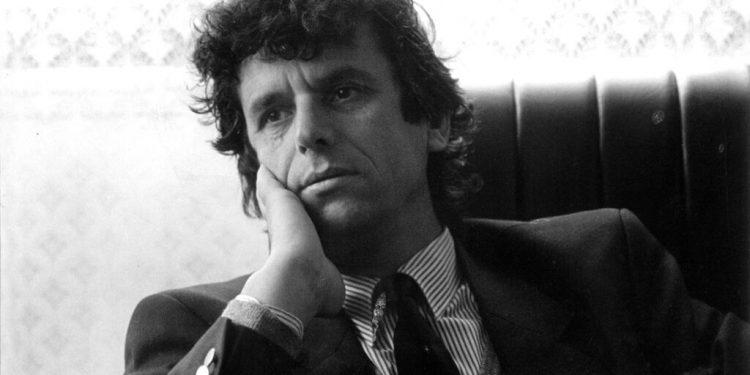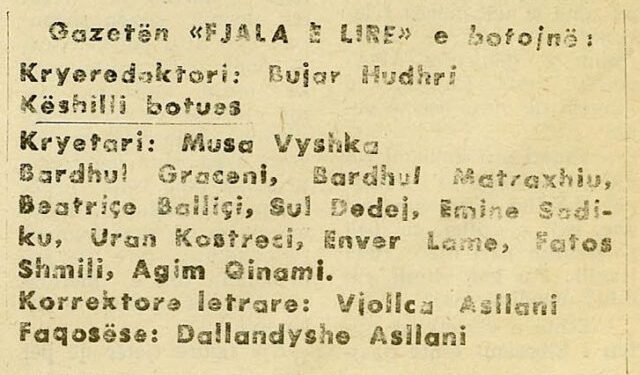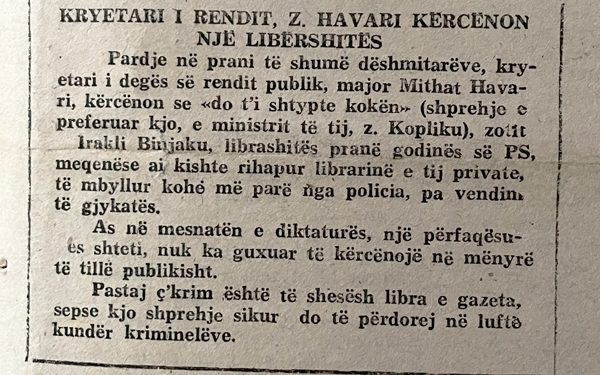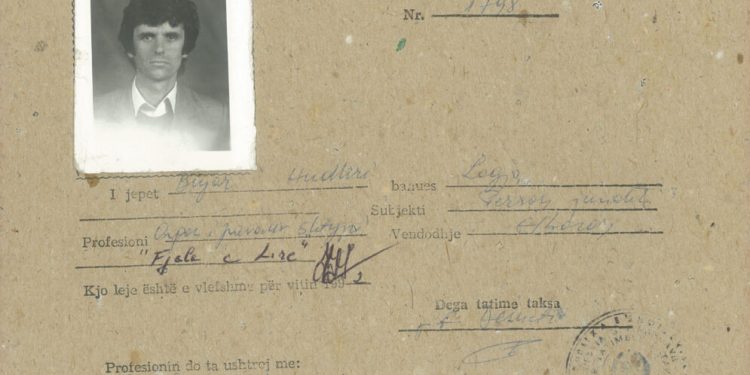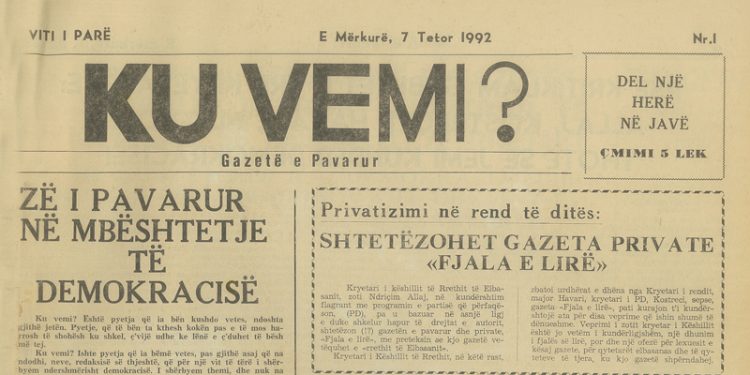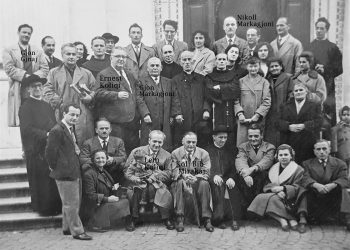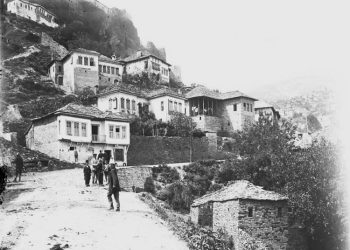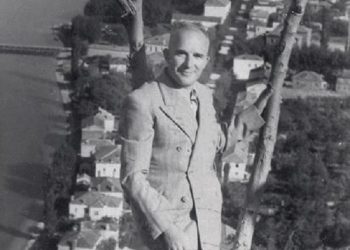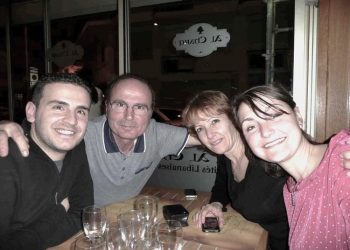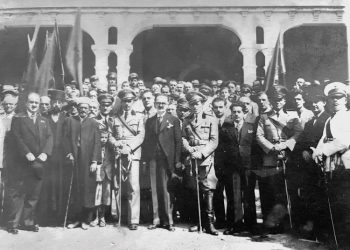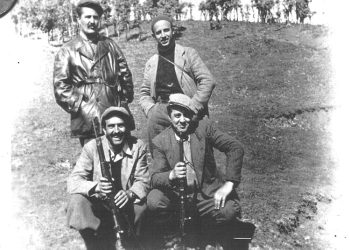Bujar Hudhri
30 years ago, on September 14, 1991, the independent newspaper “Free Speech” was founded in Elbasan. A year in the service of democracy, until the day he was nationalized by the power of the time.
Impressions of its first editor-in-chief
How I was elected editor-in-chief of the new newspaper “Free Speech”
It was the beginning of January 1991. I was invited, like many others, by the Democratic Party of the district (Elbasan) to a meeting to raise the opposition press. After many debates, hesitations in the narrow office of the mayor, the writer Astrit Bishqemi voted for the name of the new local newspaper, Fjala e azad. There was almost no objection. Then began discussions about who would run this newspaper. Complete silence. A few minutes passed, when the voice of Ruzhdi Qatipi, a former journalist of Drita, was heard, but who was already teaching in the gymnasium: “Only one person can carry out this mission: Bujar Hudhri.” Everyone turned their heads away from me and from their looks I felt an immediate approval. “He is a young journalist, he knows foreign languages,” Ruzhdiu continued, “but, most importantly, he knows what a lead letter is in a printing house.”
There was no need to vote and the choir congratulated me as the newspaper’s editor-in-chief. Then handshakes, hugs and so on.
Just as I was heading home, the cold midnight air brought me to myself. For three years I worked for the newspaper Shkumbini, the organ of the PP Committee of the district. I really had debates with them, about many things, especially since July 2, but what I had undertaken separated me from them eventually. The phrase “behold, the Democrat is coming” that I heard in a low voice as I entered my office was often repeated. To be honest, I did not close my eyes that night. I felt embarrassed about the morning that awaited me in the newsroom because I was neither an engineer, a doctor, nor an agronomist, not even a worker who was joining the Democratic Party. Although not a party member, I was in the state party newspaper.
After finishing the analysis of the two issues of the week, as every Saturday, headed by the boss, we went to the cafe of the House of Culture. My boss, Mefail Pupuleku, had been running that newspaper for twenty-five years. In addition, he held a senior position in the Union of Journalists of Albania, as Vice President. Before we got up, he told the others that he was spending some time with Bujar. You go to the office.
Here we were now face to face. I was sure the news had been leaked because it was directed at me if I had anything to say.
“I was offered a job at the Democratic Party newspaper,” I told him. I could hardly tell him about the position.
– What are you going to do there? – ngulmoi.
– I have been appointed editor-in-chief; – I said and looked him straight in the eye.
– How? Editor-in-Chief? – he said in an insecure voice and, while not looking away from me, with his long, thin fingers took out a cigarette from his favorite pack “DS” that was on the table. Then, leaning on the back of the armchair, he pulled out his lighter and lit his cigarette. He was silent for a while and as he somehow recovered, through the thick cigarette smoke, he addressed me in a tone that clearly showed the anger that he could not hide:
– I understood your thoughts in time. But to get here?! I am ashamed that a journalist like you comes out of our ranks, why should I deny it.
This closed a three-year period in the newspaper Shkumbini, where I had worked with so much passion and dedication in all its sectors, especially in artistic creativity. Now I was feeling even more that I had embarked on a journey of no return, but that a God knew how and how it would end.
The weekend shot just rain and cold. On Monday morning I left for the last time in the newsroom. As I climbed the stairs of the building, I heard the whispers of colleagues: the Democrat is coming. And they locked themselves in their offices. As soon as I got into my office and was putting some books, notebooks and dictionaries in my bag, the door swung open when I saw my boss’s pale face.
“I came for personal belongings and to separate as people,” I told him.
– You have been separated from us for a long time. We have nothing to talk about, you know.
He was right. We had nothing in common; we were honest, at least.
Through the incessant rain I went straight to the Democratic Party headquarters. These steps finally marked the beginning of a new life that had no return, but that had a lot of uncertainty, uncertainty and that the end was not known.
The enthusiasm that we could get started quickly with the opposition newspaper almost faded. Despite the constant demands of the Democratic Party, the ruling regime could not allow opposition newspapers in the districts. So my new job now was in the Democratic Party secretariat: membership registrations, spokespersons, calls, speeches, and so on. It was a time when I met new people, incredible stories that I did not imagine could have happened in our country. Yes, I was now at the center of the cyclone.
When the Stability Government was formed in Tirana, this agreement was extended to the whole country, so it turned out quite natural that the newspaper where I had once worked would become the newspaper of all parties. I was the candidate of the Democratic Party, but in the meantime another candidacy had emerged. It was Ruzhdi Qatipi. I would face him in the office of the new chairman of the Committee, ing. Argjir Panariti, one of the most cultured people I have ever known in the Democratic Party.
After two days at 5 o’clock in the afternoon, we are in the mayor’s office, together with Ruzhdi, who had hurried up the stairs not to meet me.
– Tell me about yourself, – Argjiri entered the topic straight.
– I have worked for ten years in the newspaper Drita. I ran away from there because I hit Dritëro Agolli in the eye. I can make one newspaper a day, two newspapers, as many as you want.
– What about you, Bujar? – The chairman addressed me.
– I will not say a word about myself, because you know me. While Mr. Ruzhdi, if you remember, in January proposed me as editor-in-chief.
“Gentlemen, you spoke very well of each other and I find it difficult to choose,” said the mayor, thinking of finding a way out.
“No, I did not speak well of Bujar,” Ruzhdiu replied. And he continued: -If you want to appoint Bujar, appoint mor soul, you have it in hand.
At that time, while I was learning English, I was impressed by an idiom, as far as I remember, “Hobson choice”, and the example that was taken to decipher it in Albanian was: the situation when two men want a woman or two women want a man.
I addressed Argjiri:
– Honorable chairman, we are two editors-in-chief, you have a newspaper. It is up to you to decide.
“Okay, then,” the mayor breathed a sigh of relief. – I will give the decision tomorrow.
The next day, by a decision of the secretary of the executive committee, Mr. Ardian Turku, I was appointed editor-in-chief of the newspaper Shkumbini, in place of my former boss.
After almost eight months, here I am again in front of my former boss. While he kept the newspaper alone, my colleague, Dritan Çerma, had become chairman of the Socialist Party, the others had left in various positions. But there I found my ex-classmate, Vjollca Asllani, who was the typist and proofreader of the newspaper.
When my former boss saw me at the open door he joyfully got up from his chair and grabbed me with those long arms of his.
– Well, Bujar, it seems to me, because he brought an article, because we can publish for any party, here, we adapted to the time.
“No, I brought this letter,” I told him.
He took it, but because he had no glasses, he went and sat down at the table and was reading it aloud. I could see this from his lips. Then he turned to me:
– What is this? I do not understand anything. Dale, let’s ask once.
I do not know why I was in pain and to be honest, I would never have wanted this confrontation to happen. I knew better than anyone: that newspaper was his life.
“I’m leaving,” I said. – Until the stalemate is resolved.
And I carefully closed the door.
When I went to the Democratic Party, I met with the chairman, ing. Fatmir Manushi. I told him the whole dialogue with my former boss, when he received me:
– What is this gentleness? What is this romanticism? Go and get the newspaper, so long as we wait.
“We’ll wait until tomorrow,” I said.
And indeed, the next day the former boss calls me. We left to meet at the former cafe, at the House of Culture. Coincidentally, the only empty table was exactly where we were sitting for the last time.
– Order the keys, Generous. I understand, now is your time. Good luck.
The ringing of the keys on the table was heard. As if marking a new period in my life.
The first issue of the newspaper “Free Speech”
On September 14, 1991, the first issue of the newspaper was published. My brother Feridi helped me with the title of the newspaper, because he had a friendship with the talented painter Bujar Marikaj, who had made the logo of the Democratic Party and the newspaper Rilindja Demokratike. I appointed a publishing council with the most prominent names in Elbasan at that time:
Musa Vyshka, Bardhyl Graceni, Bardhyl Matraxhiu, Beatriçe Balliçi, Sul Dedej, Emine Sadiku, Uran Kostreci, Enver Lame, Fatos Shmili, Agim Qinami.
For the first time in almost 50 years an independent newspaper was founded in my city and it was entrusted to me.
With my friends, Mustafa Xhepa and Kujtim Bevapi, we celebrated this day that we had dreamed of and discussed dozens of times during the long hours when we were sitting in the cold hall in winter or hot in summer in the Library of Elbasan.
At first the newspaper came out once a week, then twice a week, although I had no journalists on staff, except Vjollca, who, despite the change of systems, remained there, thanks to her skills and culture. At the end of the year, three or four months later, funding from the committee was cut off. In addition, the owner of the building where the editorial office was located came out. For the first time the heirs rented from us. For this reason I went to the mayor, Argjiri, worried. I have no right to continue funding, the law does not allow me, and he told me. How come I do the Democratic Party propaganda and you do not pay? This newspaper is not mine. Write what you want, said Argjiri. This is not just a newspaper for the Democratic Party, but for all parties. You can even add some eroticism there, as very serious is making the newspaper. (I had interviewed Bim Dakli, an Elbasan man who had come to Milan after half a century, who instructed me, as if he knew what Argjiri meant to me: “The disease of the press in a post-dictatorship is eroticism. Be careful; do not fall into this trap! ”)
I left angry, but at the same time liberated from a party burden. All I would do was just what I had dreamed of all my life. And now, I was missing nothing. Being sold in Tirana with a large circulation, the newspaper in the meantime was becoming popular and almost all important figures of the Albanian transition have given interviews there. I have to admit: this newspaper did its best to win the opposition on March 22, 1992. And the support continued for some time. All my friends had already come to power and by itself a complicated situation arose for me as a journalist.
In May, I applied to the district court to legalize this newspaper, ie to obtain the right to practice the profession.
The Elbasan Tax Branch gave the license to practice the profession, no. 1798, dated 19.6.1992:
“Mr. Bujar Hudhri, for the publication of the independent press body Free Speech”, signed by Fatos Demeti, chairman of the Elbasan tax branch
We ran away from the building which the former owners took. From the internal inventory we were left with dozens of volumes of works by Enver and the classics of communism that we sent for cardboard. Also, a long table that I donated to the Association of Orphans in Elbasan and some smaller tables and amortized shelves I donated to other associations, since the editorial office was placed in the former NTUS directorate, in two small rooms where we had no space required.
Yes, now we were starting a new life, an independent newspaper, just as it was conceived by all that cold January night. But could we really be independent? Because my friends were in power now and I had to be in front of them and support the public.
The new government launches pressure on the newspaper “Free Speech”
It took an editorial to bring us to ourselves. The new committee chairman, a good friend of mine, called us, some journalists, and the day before the committee meeting. There are two corruption files. I will denounce them tomorrow in front of everyone, he told us.
The committee meeting was held and no dossier was mentioned. I was very disappointed and went straight to the newsroom and with one breath I wrote the editorial entitled “The new chairman of the anti-corruption committee: will there be a winner?”.
How many times have I seen this newspaper, many years later, I wondered: how is such a headline possible? How could I be so idiotic? (It seems unbelievable to me even now that I am writing and this is not a good sign. How much enthusiasm, hope, we had in the new democratic order. But how much sadness!) I meet the mayor in the afternoon in the company of the city parish. He was yellow when he saw me. I wrote it to tell you that the press does not leave you alone, I said, Yes, yes, he told me, strangely. Of course he was saying the opposite.
The same situation arose after a month. Yet another editorial, now for the head of public order, Mit’hat Havarin, another friend of mine. In the first interview he gave to our newspaper, he confessed how noble he had been with the staff of the branch of internal affairs, he had all suffered personally, unjustly, when he was arrested after the demonstration in Elbasan. I really appreciated this behavior and expressed it. But only a week passed when a bookseller came to my office, Irakli Binjaku, who had previously been an instructor for the party’s culture committee. He had opened a small bookstore before the election, where he sold all the newspapers. He told me that the head of public order had threatened to close the bookstore, for which he had a tax permit.
There were not even ten lines in this editorial. Apparently, I had now become annoyed with the new government and a fierce pressure was put on me and the newspaper. Touched by the seder and convinced of my and the bookstore’s innocence, I wrote another issue, which completely separated me from the Democratic Party, and this incident led to the nationalization of the newspaper.
Why do I still say that the new government nationalized the newspaper “Free Speech”
I am not wrong to say so, because indeed my independent, licensed newspaper began to be published by the Democratic Party. In the following issue of my newspaper “Free Speech”, the article of the chairman of the Democratic Party, my friend, Uran Kostreci, was published with the title “Obituary for the living for the former editor-in-chief Bujar Hudhri”. I would understand the DP, if it closed my newspaper, but by no means continue the serial number where I was stopped. I complained in all instances, up to Berisha. At the Ministry of Justice, the Deputy Minister, Mr. Kristaq Traja, honestly stated to me: “You are the classic case of innocence, but I cannot help you!” I told him I would not stop my fight. Mr. Traja lowered his head and did not add any more words.
That “Free Speech” was my private newspaper is evidenced by my license to practice the profession.
Since it was impossible to regain ownership of my newspaper “Fjala e Lirë” as well as in the conditions when there was a lack of independent media but everything was state I was forced to establish another newspaper, to clarify what had happened to me and my newspaper private.
The first issue of the newspaper “Ku Vemi” was published on October 7, 1992.
I was also obliged to respond to the “Obituary” written to me by my friend, the chairman of the Democratic Party, Uran Kostreci. When I read my answer today after so many years, I feel a great relief before the reader as well as before the soul of Uranus, who has passed away this summer. He had told me that he loved a girl in Elbasan, from his greenhouse, to which he dedicated, perhaps, the most beautiful sonnets of Albanian literature after Ndre Mjeda. I published one of the sonnets in the first issue of the newspaper “Free Speech”, the one entitled “Moon”.
The newspaper “Ku vemi?” followed by several issues, until the day the news was announced:
“ONUFRI” PUBLISHING HOUSE IS ESTABLISHED
On 20.11.1992, the Minister of Culture, Youth and Sports, Mr. Dhimitër Anagnosti, gave the approval for the establishment of the publishing house Onufri, with President Mr. Bujar Hudhri. From that day I devoted myself completely and only to publishing books!
Epilogue
Many of the characters I have described in this newspaper I have met again and we have left to the past everything that happened between us. All the more so when all the debates, grievances, dissatisfactions did not arise from self-interest, on the contrary.
In November 1999, Mrs. Albina Karamitro, one of the most important figures of the Democratic Party at that time, came to our editorial office.
“I have been recommended two publishing houses for my book,” he tells me. – One is clear which political wing he belongs to, and they told me about Onufri, we do not understand.
I told her the whole story I described above and, when she came the next day, she told me:
-Doctor (Berisha) had more information than you. Do you want to meet him?
The next day, with a bag full of new publications, I go to meet Berisha. For over half an hour we talked about Lasgush, Kadare, Pushkin, and Esenin…
When we went out Albina, who was always like a thorn in the side, already quite calmly expressed her gratitude for my behavior. I politely replied:
-What was the point of talking to the Doctor about the past? Whoever joined the Democratic Movement has won: he became famous, he became an MP, and he became a diplomat. They became rich. They realized the dreams of their lives. Therefore, no one has the right and reason to hold accountable what happened in the distant year ’91 -’92.
The roads parted with Havar, but I always followed with sympathy his climbing career. Only with his strength, relentless, brave and quite original. I remember that when Kadare came to Tirana at that time, he simply praised Havar for the work he did. My sympathy for Havar is compounded by a simple fact: his honest life (while his former colleagues own villas and hotels, he lives in an apartment in a neighborhood of the capital.) And his talented children, son and girls, working in European Union institutions.
I met Uran Kostrec after he came from America. I published his beloved book “The Locust Epic” and the novel “Infidelity” in two languages. We had designed a book with all his sonnets, but the pandemic did not allow us. Perhaps this volume of sonnets by Uran Kostrec would remain the most beautiful memory for a publisher, for that stormy time that never returns./Memorie.al




